
First came the butterflies. The fluttery insects filled Chari Hawkins’ stomach before a competition. Pre-event jitters are part of sports, yes, but this was so much more. They’d spread to her arms and legs, causing such physical pain she wasn’t sure how she would hurdle down a runway, launch a javelin, or hurl herself over a high jump bar.
Then, they would infiltrate her mind, seeding doubts and failure as the only outcome for the competition ahead, spiraling her body into a deep state of paralysis. So tense, she feared taking a step.
Tears quickly followed. Not tears of sadness, but tears of anger. How could she train for so long with so much success during practice only to freeze in the most important moments?
Come on, Chari, she would say, what’s wrong with you?
Hadn’t her dad always told her she had the heart of a champion? Then why did she keep failing? She questioned ways to flee and free herself from the torment. What if she faked an injury? No, to hell with faking! What if she purposefully tore her Achilles?
Hawkins felt the flutter of those butterflies for years, inducing crippling panic attacks that crushed her chances of succeeding and destroyed her sense of self-worth.
That is until she chose to fight back.
The first panic attack Hawkins remembers came in college. She was a freshman with the Utah State Aggies track and field team and a young star of the heptathlon.
For every competition, she competed in seven events: an 800-meter run, a javelin throw, a long jump, a 200-meter run, a shot put, a high jump, and 100-meter hurdles.
Admittedly, she wasn’t sure what she was getting herself into when she entered college. Hawkins played multiple sports in high school and dreamed of playing volleyball for Team USA one day. Track took some getting used to. She hated running and thought it was so stupid, but she joined because of FOMO, or fear of missing out with her friends. She soon learned to love the individuality of the sport. Unlike volleyball or basketball, success or failure on the track came because of her and her alone.
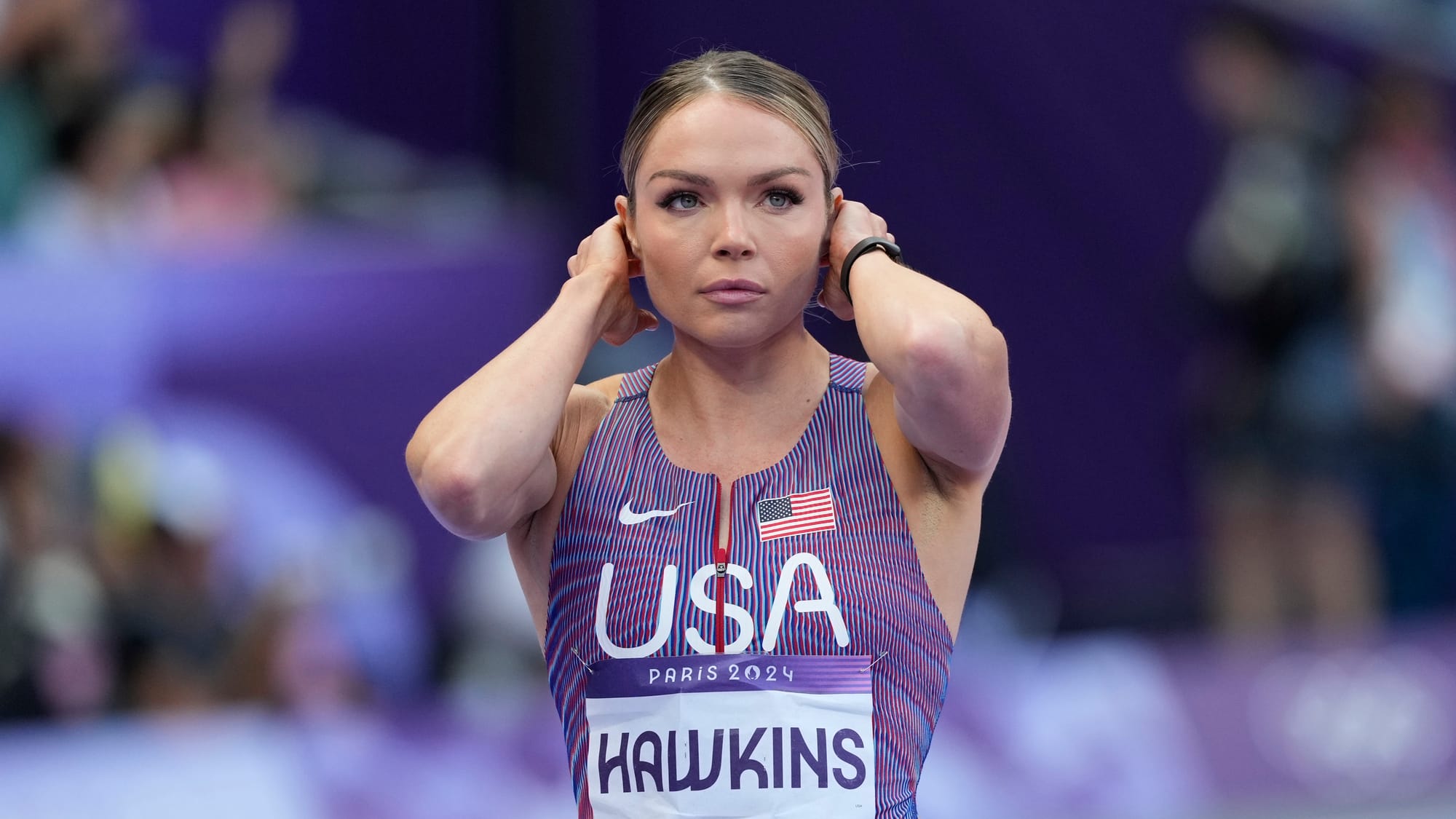
She was limited to competing in four events during a high school track meet, which always left her wanting more. Naturally, when Utah State called about the heptathlon and its seven events, Hawkins was thrilled.
During her first conference meet, Hawkins was in first place with only the 800-meter race remaining. The distance was something new, and she hadn’t been taught how to attack the race. All she was told before reaching the starting line was, “All it takes is a little heart.” She laced up her spikes and built an early lead.
Hawkins is fast, but carrying sprint speeds for long distances can tire the best athletes. After her first lap, Hawkins felt her legs giving out. She fell to the back of the pack and ultimately out of first place.
The pain of second place didn’t bother her, but rather the words spoken before she ran: All it takes is a little heart. It sounded awfully familiar to what her dad told her growing up: You have the heart of a champion.
When she played well, when she won, fans yelled, “YOU’RE AMAZING!” and her dad would praise her with his famous line.
But what about the times she didn’t play her best? “It’s not that everybody would tell me I was the worst,” she says, “but people weren’t really saying much, you know. I was getting taught inadvertently that every time I stepped on the field or every time I stepped on the track that my humanity and my worth and my ability to say ‘I have the heart of a champion’ was up for grabs.”
As soft as a flutter of a butterfly’s wings, the panic attacks took hold.
The worst panic attack of Hawkins’ career came during the 2019 USATF Indoor Track & Field Championships. Once again, she found herself near the top of the leaderboard — a “shoe in for silver,” she says. That’s when she felt the all-too-familiar flutter.
She fled to the bathroom unable to breathe and begged for the feeling to vanish. Terrified, she approached the top of the lane for the long jump with muscles so tight that she pulled both hamstrings while extending herself into the landing pit. She could barely walk, let alone run. Defeated, she withdrew from the competition and called her parents.
“I can’t keep doing this work, showing up to practice every day, putting my blood, sweat, and tears on the track, and then showing up to competition and I can’t even get it together to perform,” she cried.
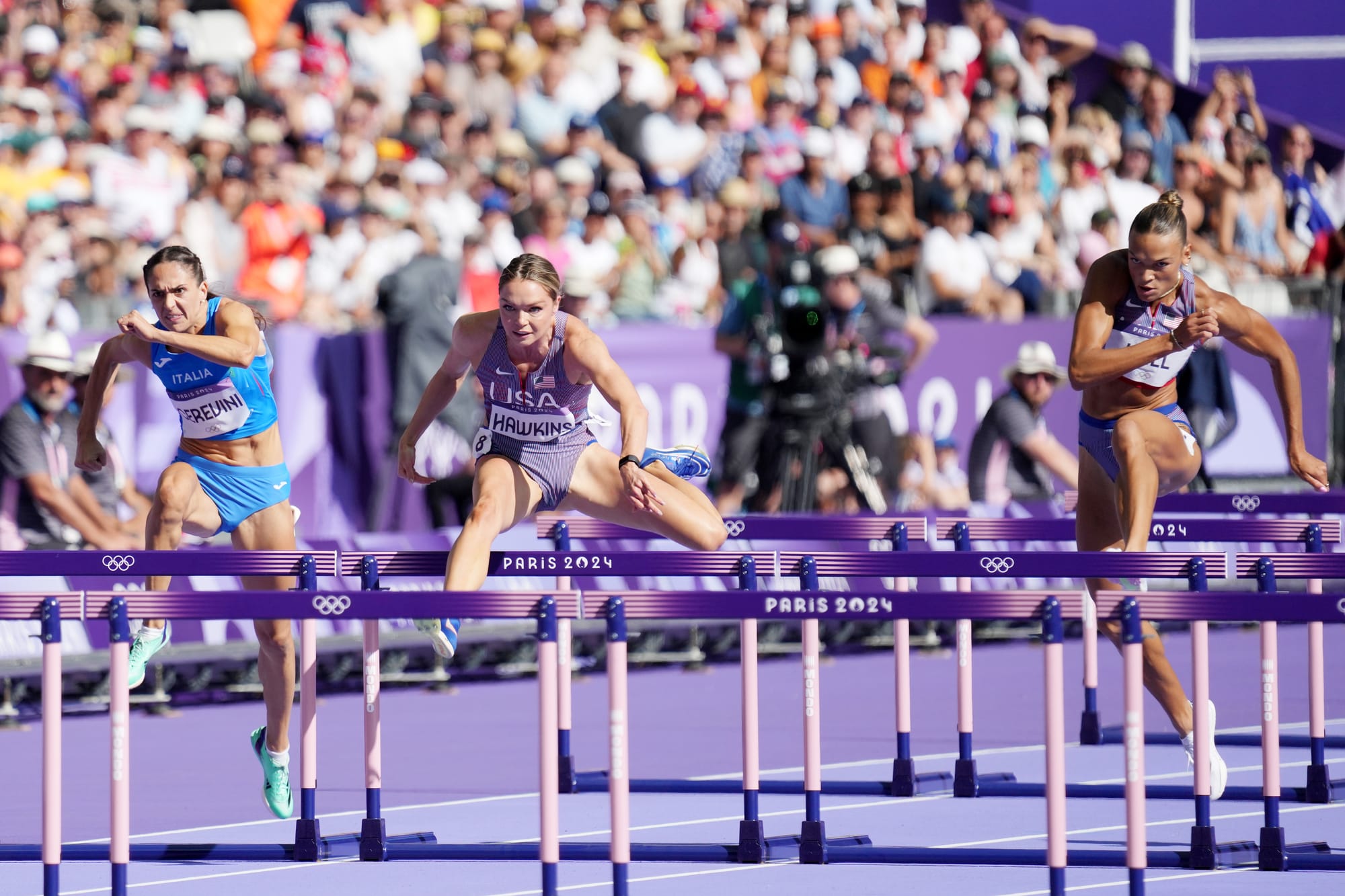

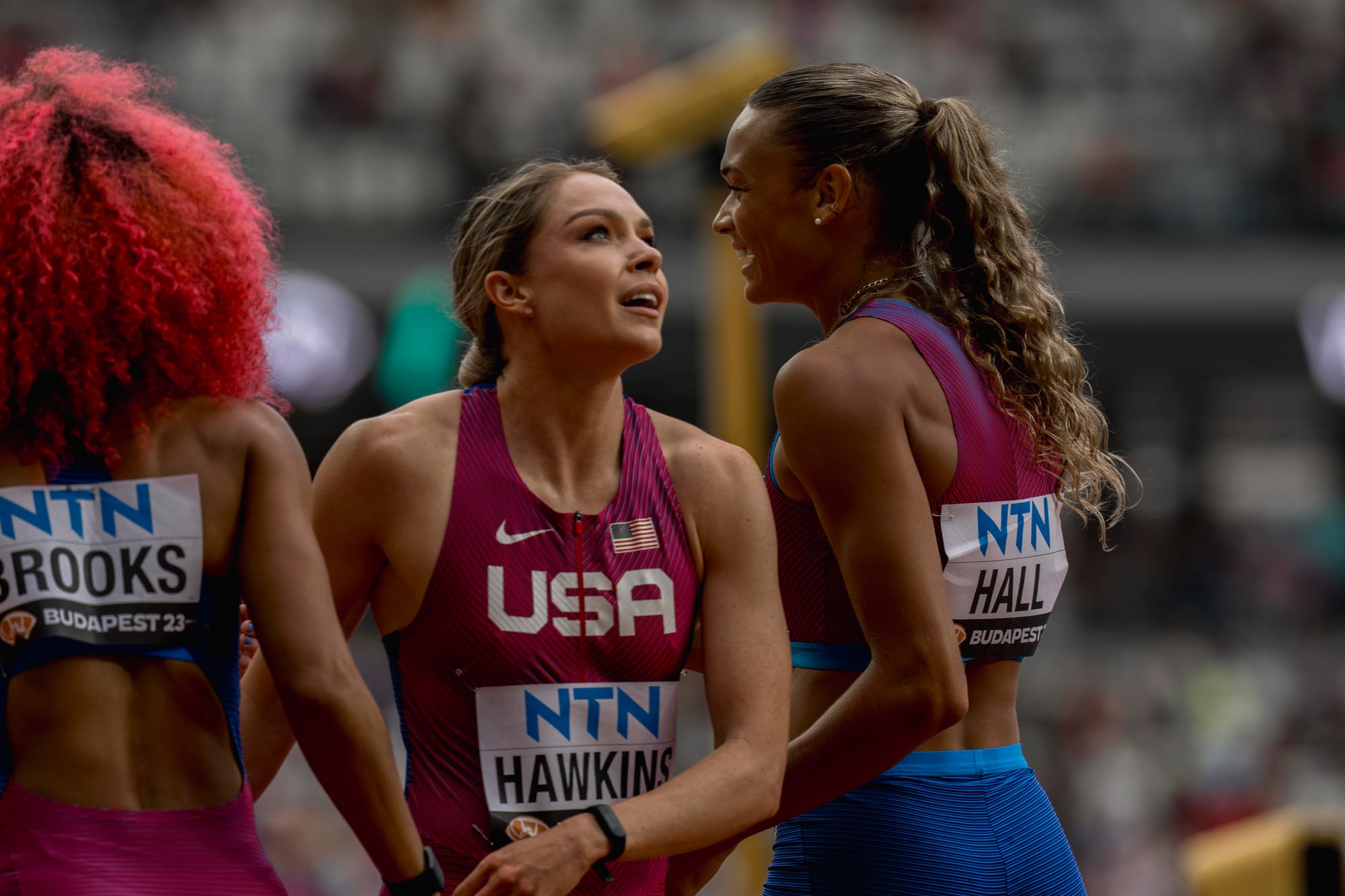
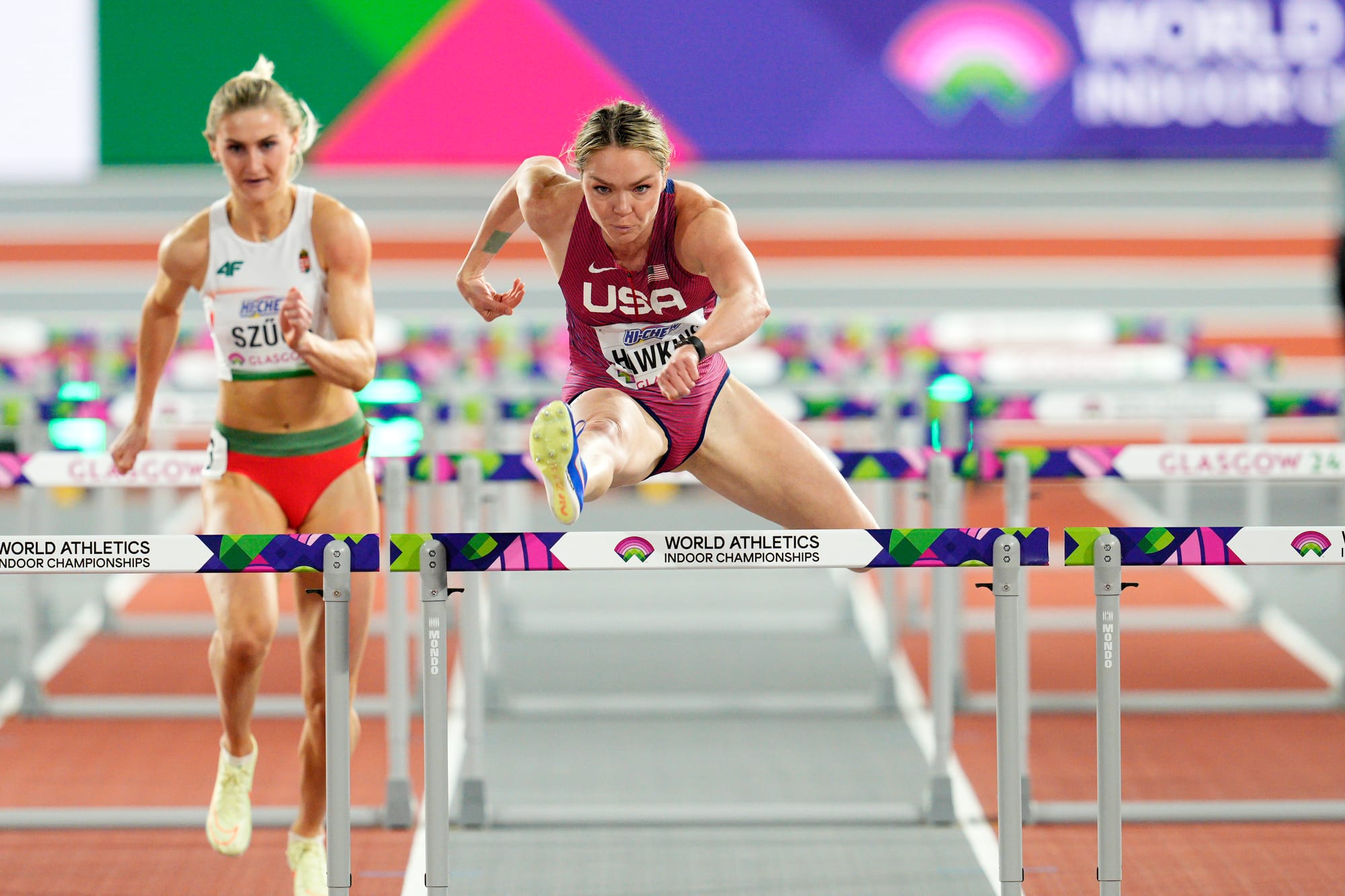
Chari Hawkins says self-awareness is one of her superpowers. [USA Track & Field photos]
She wasn’t ready to retire, but she had to gain control of her crippling anxiety. Since it was coming from within, that is the first place she looked.
“We don’t know what we don’t know, so we’re not curious about what’s going on inside of us, and there’s no way to solve it,” she says. “I started asking, ‘What’s happening to me?’”
Self-awareness, Hawkins says, is one of her superpowers. In college, she made a New Year’s resolution to stop exaggerating details when speaking with her friends, because it hurt her credibility when everything was the biggest or the best or the worst. She started calling herself out in the moment: “I’m sorry. I’m lying to you. Let me start over.”

It's that ability to reflect that led her on a months-long journey that saved her career. She journaled her feelings, asked herself hard questions about her anxiety, and spoke to athletes about mental health. She heard from one athlete that their worth isn’t attached to their sport. What was otherwise a passing comment led to a breakthrough for Hawkins, who relished in the praise of success and wallowed in the silence of defeat.
She learned that “having the heart of a champion doesn’t necessarily mean you’re a champion,” she says. “It means how you show up every day.”
The most crushing moment of Hawkins’ career didn’t come because of a panic attack. At this year’s Olympics, Hawkins, in her first Olympic Games, failed to clear a high jump bar at a height that she had never missed in previous competitions. The result: zero points and dashing any hopes at a medal.
The heartbroken Hawkins broke into tears. “Within that shock, within that anger, within that disappointment, I kept wanting to scream, ‘I’m so sorry! I’m so sorry! I’m so sorry to everybody — to the people who came to watch me, for all the work I did for myself, for potentially ruining a lot of partnerships and opportunities. I felt like I let everybody, including myself — past and future me — down. I felt so devastated,” she says.
The chaos down on the Olympic field may have had something to do with it. There was a relay happening at the same time as the high jump, and there was no official around alerting athletes they were up next. Before she knew it, Hawkins was rushing to the starting line for all three of her attempts. But she’s not one to make excuses. If anything, through her journey she’s learned acceptance.
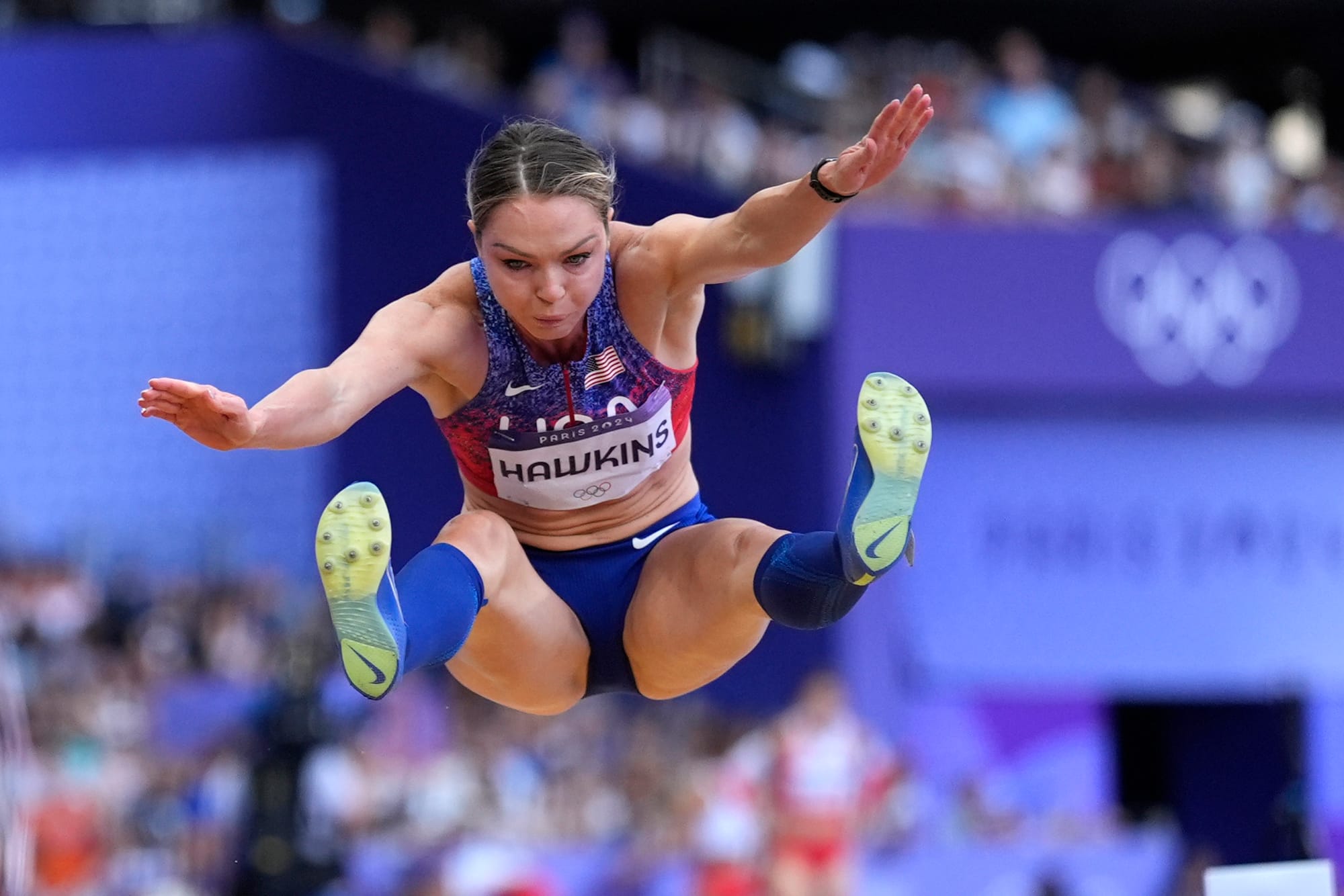
She accepted that the best she had to give that day was three misses in the high jump. And while many speculated if she would compete in the final five events, Hawkins knew she would undoubtedly finish. She had made it to the Olympic stage, a place where so few people get to step foot. She wasn’t going to medal, so she focused on what she could control: herself.
She can control how she approaches each day with a smile and a positive attitude. She can control her training, knowing when to press harder and when to back off. She can control how she approaches competition, giving her best even when it doesn’t result in a medal. Most importantly, she’s learned to control her mindset: distancing her results from who she is as a person.
Because of that, she says, “I’m actually able to enjoy competition for the first time in my life. My goal isn’t necessarily to win; my goal is to show up as my best.”
Therein lies the heart of a champion.
